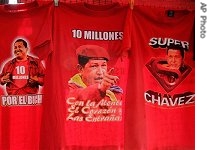2006年VOA标准英语-Venezuelan President Hugo Chavez Seeks Re-Elect(在线收听)
By Michael Bowman
Caracas
02 December 2006
Venezuelan President Hugo Chavez' bid for re-election Sunday is one of Latin America's most closely-watch democratic exercises. VOA's Michael Bowman reports from Caracas, more than 70-percent of Venezuela's 16-million eligible voters are expected to cast ballots.
 |
| T-shirts with the image of Venezuelan President Hugo Chavez are offered for sale in downtown Caracas |
Caracas resident Yolanda Rodriguez, an ardent supporter of President Chavez, says she cannot wait to cast her vote.
She says, "As far as I am concerned, President Chavez is the greatest man ever born in Venezuela. The way he helps so many people - the humble, those who never used to count in society. We are with him wherever he goes, whatever he asks of us. As he says, 'Our country or our lives.'"
If victorious, Mr. Chavez has promised to launch a new phase of his so-called 'Bolivarian Revolution,' whereby much of Venezuela's oil wealth has been directed to social programs for the poor. The president, who has ruled since 1998, has provided few details about what, specifically, he intends to do if given a new term in office. But he has cast the election as a contest between Venezuela and what he describes as 'the empire' of the north, the United States.
At a closing rally in Caracas, he said, "Who is our adversary? The most powerful empire on earth. But, on Sunday we will defeat that empire by a knock-out."
Mr. Chavez added he will dedicate an electoral victory to his closest ally in Latin America, ailing Cuban President Fidel Castro.
Most pre-election opinion polls project victory for the president. But opposition candidate Manuel Rosales, who temporarily stepped down as governor of Zulia State to pursue his presidential bid, says momentum has shifted in his favor.
He says, "Months ago, they [the Chavez campaign] claimed to have more than 80-percent support. But do you know what all the polls say today? The accurate polls, the ones that have not been bought or manipulated, say that, soon, Venezuela will have a new president."
Rosales has accused President Chavez of wanting to transform Venezuela into a communist dictatorship, and argued that crime and corruption have worsened under his rule. Rosales has come up with his own plan for distributing Venezuela's oil revenues: through government-issued debit cards that would be given to the populace.
The opposition boycotted legislative elections last year, saying the vote was rigged in the ruling party's favor. For this year's presidential vote, Venezuela has implemented what many observers regard as the most exhaustive set of electoral safeguards ever seen in Latin America, including fingerprint voter identification, electronic balloting with a paper receipt, and heavy vigilance of all polling stations.
German Yepes is a rector of Venezuela's National Electoral Council. He says, "The automated system used in the electoral process is subject to thorough review by election workers, representatives of all candidates, and international observers from the Organization of American States and the European Union."
Observers from Mercosur as well as the Atlanta-based Carter Center are also on hand. Venezuela is deploying more than 100,000 troops to protect polling stations across the country.
At a news conference Thursday, President Chavez said Venezuelan intelligence had uncovered and foiled a plot to assassinate his opponent, Manuel Rosales. He provided few details, and there has been little subsequent comment on the matter by Venezuelan officials. Overall, the campaign season has been boisterous, but without major controversy.
Authorities are urging people to cast ballots with confidence and tranquility. But many Venezuelans are taking precautions in case of post-election disturbances.
Shoppers have mobbed Caracas supermarkets ahead of the election, buying food and provisions to last for days and, in some cases, weeks.
Friday, Magda Reyes struggled to push a shopping cart overflowing with groceries. She said, "People are buying out of nervousness. No one knows what may happen, so we are taking precautions. This is the third time I have bought food this week."